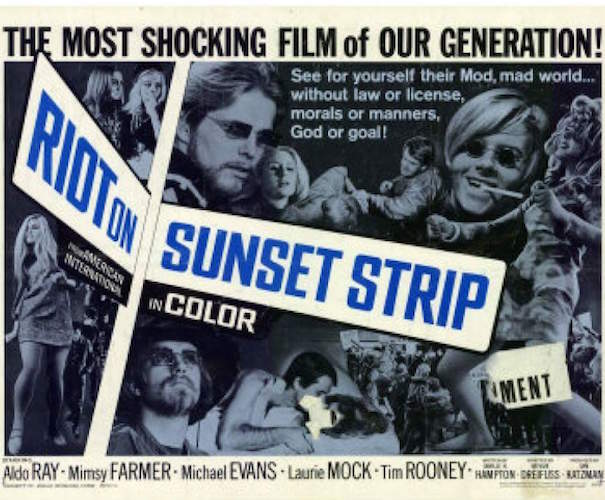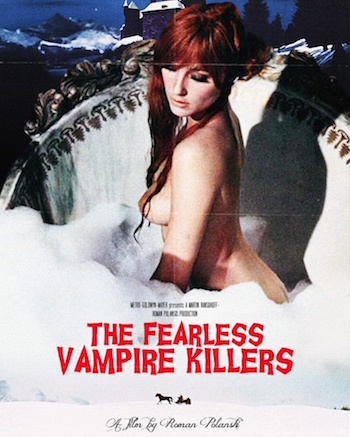Film Feature: Summer of Love Series — Retro Balm for Turbulent Times
Summer of Love’s line-up contains some of that iconic year’s most indelible works of cinema.

By Peg Aloi
The Somerville Theatre’s new repertory film series, Summer of Love, brings a quartet of dynamic offerings — all released in 1967 — to a theater that’s been making an impressive name for itself with meticulous presentations of big screen 35mm features. The line-up contains some of that iconic year’s most indelible works of cinema, ample proof that this was indeed the dawn of what would become one of the most groundbreaking decades in the movies, especially in the United States. The collection kicks off this Wednesday night at 7:30 p.m. (and continues on Wednesdays throughout June) with director Roman Polanski’s creepy, opulent, outrageous, and funny Fearless Vampire Killers.
The Summer of Love was the high point of a transformative political and cultural decade. Among the era’s roiling changes: civil rights protests, women’s liberation, the occult revival, increased use of hallucinogenic drugs, the sexual revolution, dynamic experimentation in popular music, the rise of the environmental movement, startling trends in fashion and, perhaps most significantly, widespread public protest of the Vietnam War. The period’s intense energy and cultural upheaval inspired an iconography (often romanticized today) that was colorful, bold, and often shocking.
June 14 brings Valley of the Dolls, directed by Mark Robson (Peyton Place, The Inn of the Sixth Happiness) and based on Jacqueline Susann’s best-selling novel detailing sex and decadence among Hollywood starlets. An Oscar-nominated score by John Williams, a stellar cast including Patty Duke, Lee Grant, and Sharon Tate (actress, model, and wife of Roman Polanski, who was murdered by Charlie Manson’s cult in 1968), and vibrant cinematography and costumes make this time-capsule bauble worth seeing. Wear your paisley and go-go boots.
On June 21 comes Riot on Sunset Strip. Directed by German-born Arthur Driefuss, whose film and TV career in Hollywood spawned many important moments in popular culture, the film follows a bunch of teenage hippies and punks rioting in the streets of Los Angeles. As if that isn’t enough, there’s also a hip soundtrack and far-out costumes. Rumor has it the film is loosely based on actual events. The series finishes up with avant-garde fervor on June 28 with Jean-Luc Godard’s notorious black comedy Weekend, a trippy, genre-defying film about a raucous (and surprisingly literary) bacchanal in the French countryside.

Seeing these works in 35mm underscores their visual beauty and thrilling sound. But the program’s theme — evocations of a time Americans relished a shift in the social paradigm — resonates today. Given how tense many of us are feeling about the current world of politics, it’s inevitable we would look back at a period of social turbulence for answers and spurs to action. I spoke with the series’s curator, Julia Marchese, a Hollywood-based filmmaker whose documentary feature Out of Print is a paean to the New Beverly Cinema, where she worked as a programmer for eight years.
I asked Marchese why contemporary filmgoers should see 35mm as being particularly relevant:
“Beyond the incredible, warm beauty of it, film is an absolute necessity for archiving. 35mm film has been the medium for making and watching movies for more than a century, and yet we have moved to digital, which is changing formats at lightning speed. Somehow I think that the 2k and 4k projectors used today will be obsolete within twenty-five years, let alone a hundred. Preserving film’s history is so very important. And I feel so strongly about 35mm I made a documentary about it, and the wonderful theaters that show it, so you know I’m pretty hardcore.”
I also wondered why Marchese thought this particular year in cinema was so meaningful today:
“The amazing thing about the Summer of Love was that it was a snapshot of the entire hippie movement, in a way. Look at that snapshot and study it, and one word will leap out at you: peace.
The peace sign, both in symbol and hand sign, are ubiquitous with the 1960’s – it’s what the hippie movement was working towards, consciously – all at once – for a moment. That was fifty years ago, and society has never quite captured that same focus on kindness and love again.
People look back now at the hippies and call them naive idealists, but what they’re missing is that is what made the hippies so extraordinary. More than anything, the hippies had hope. Hope that we really could all love each other and that we could choose peace over violence. Simply stop fighting and love one another. That’s not such a bad thing to strive for, is it?
When you watch these films, mentally time travel back to 1967 and allow yourself to let go and feel that hopefulness — and hope that, maybe this time, love really will conquer all.”
The Summer of Love series, in glorious 35mm, begins this Wednesday (June 7) and runs through the month of June on Wednesdays at 7:30 pm at the Somerville Theatre.
Peg Aloi is a former film critic for The Boston Phoenix. She has taught film studies for a number of years at Emerson College and is currently teaching media studies at SUNY New Paltz. Her reviews have appeared in Art New England and Cinefantastique Online.
Tagged: 35mm, Fearless Vampire Killers, Julia Marchese, Out of Print, Peg Aloi, Somerville Theatre, Summer of Love, Valley of the Dolls
